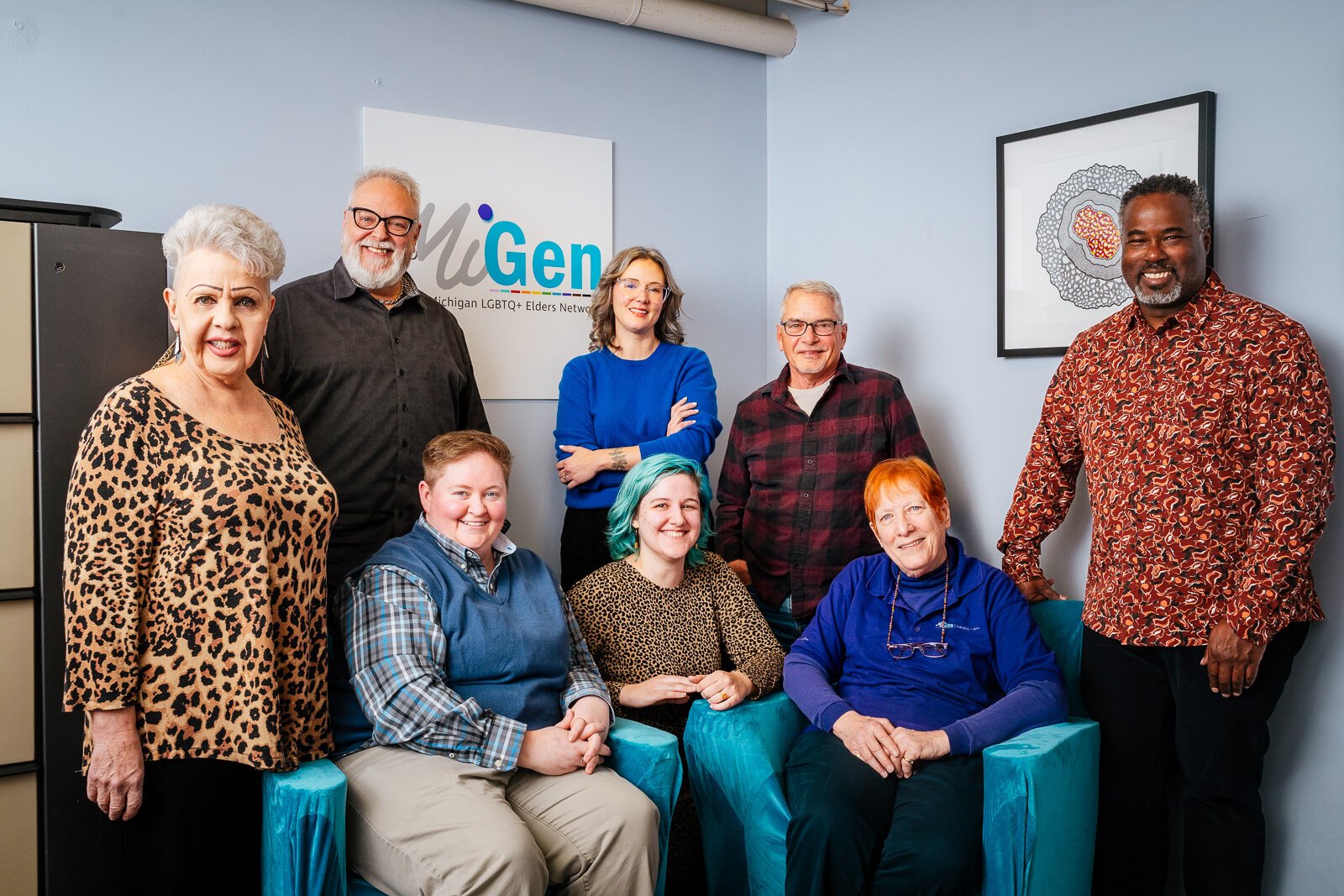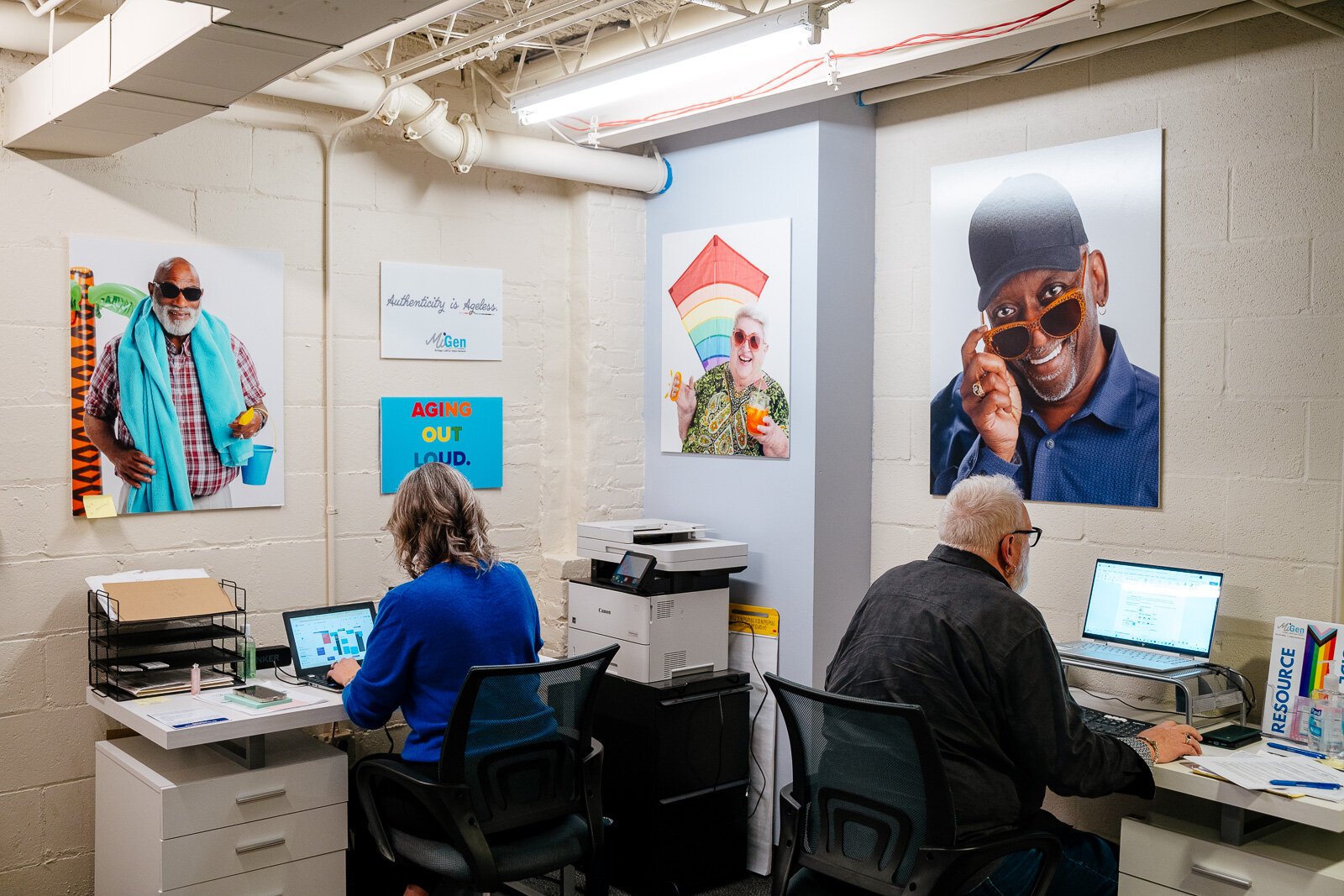By Estelle Slootmaker | February 15, 2024

MiGen staff and community in MiGen’s office space/Senior Center at Affirmations.Nick Hagen
This article is part of State of Health, a series about how Michigan communities are rising to address health challenges. It is made possible with funding from the Michigan Health Endowment Fund.
On Jan. 16, nonprofits MiGen and Affirmations LGBTQ+ Community Center opened Michigan’s first LGBTQ+ senior center in Ferndale, and they will open a second such center soon in Detroit.
The Senior Center at Affirmations, 290 W. Nine Mile Rd., expands programs and services for LGBTQ+ seniors in an accessible, welcoming environment where they can connect, engage, and access essential resources, health services, and other programming. The space doubles as an office for MiGen, but staff will vacate the space if needed for events.
 MiGen’s office space/Senior Center at Affirmations.
MiGen’s office space/Senior Center at Affirmations.
Affirmations Senior Koffee Klatch (SKK) member Jack Butler is among the Center’s first volunteers. He jests that he wants to “man the phones for the department of loneliness.”
“I was partnered for 42 years to a great guy. And he died suddenly of a heart attack about three years ago. The last time I was single, I was 27,” Butler says. “About a year and a half into my new existence, I realized I had no idea where single people were. I think it was the week before Christmas [that] I went to Affirmations.”
Butler shares that finding a place where he could simply sit and comfortably chat with others made all the difference for him. He soon became an SKK member and enrolled in other Affirmations programs.
“You can go in and just sit there on a couch,” Butler says. “If you don’t know what’s going on, somebody will come and say, ‘Can I help you?’ You can just sit there and be alone. But eventually, you see people interacting and laughing and having a good time and you realize that there’s a possibility.”
With the opening of the Senior Center, older LGBTQ+ adults will be even more comfortable.
“I just love the place. I think it’s great,” Butler says. “I have found very warm, nonjudgmental people in my own sphere and experiences. I know a lot of people could really use the feelings of connection … through grief, like myself as a widow. You need to be re-integrated into some kind of social group because, as we see everywhere, as you deal with things, you keep some sense of loneliness.”
A win-win
The nonprofits that opened the Senior Center both have lengthy experience serving Michigan’s LGBTQ+ community. MiGen provides services, advocacy, fun, and connection to LGBTQ+ folks ages 45 and up. Affirmations has been the hub for southeast Michigan LGBTQ+ communities and their allies for the last 30 years. While Affirmations serves all ages, Executive Director Cheryl Czach believes the Senior Center will be a great enhancement for older LGBTQ+ adults.

“Partnering with MiGen is really a win-win for both of our organizations,” she says. “It allows Affirmations to provide programming beyond what we could do independently. One thing that we’ve heard repeatedly from our older population is that they’re looking for grief support, resource navigation, transportation assistance, and housing support. Partnering with MiGen, who are really experts in delivering these senior services to an LGBTQ community, will allow us to better meet those needs.”
The Senior Center offers drop-in hours so older adults can meet with staff for resource navigation. Czach plans on developing more social programming at the center in partnership with MiGen.
“As we age, we can start to feel more isolated,” Czach says. “We might have limited mobility, or driving becomes more of a challenge. We lose some of our social spaces that work might have provided for us. We might start to lose folks that we care about, and so loneliness and grief can be issues. There’s also support needed to navigate resources, transportation, or housing. These issues become even more acute in the older LGBTQ population, where many feel they must go back in the closet for safety reasons.”
Some may ask why LGBTQ+ older adults can’t go to senior centers that are already in their communities. MiGen Executive Director Angela Gabridge says they can and should, as those existing senior centers offer a host of resources. But will they find peers with similar life experiences to connect with? Will they be able to access services that meet their unique needs? And do LGBTQ+ older adults feel they can be their authentic selves at those centers?
“In the traditional aging-care environment, we’ll often hear from folks, ‘Well, we don’t have any LGBTQ people at our senior center.’ Statistically that’s impossible. There are 65,000 older adults in the LGBTQ community here in southeast Michigan. We actually have the seventh largest LGBTQ population in the country here in the state of Michigan,” Gabridge says. “We know our people are already in those spaces. It’s a matter of whether or not those spaces are set up to work with our folks. There are billions of dollars that go into senior services across the state every single year. None of that is allocated specifically for LGBTQ older adults.”
A second center at Corktown Health
Later this year, MiGen will open a second LGBTQ+ senior center at Corktown Health in Detroit.
“The communities deserve this,” Gabridge says. “For a long time, there have been dozens of spaces across the state for LGBTQ youth. But we didn’t have a single one for older adults.”

The first medical center focused on serving the LGBTQ community in southeast Michigan, Corktown Health offers primary care, behavioral health services, comprehensive HIV care and treatment, cancer screening, health insurance navigation, and other related services. The new senior center will be located in an 11,000 square-foot space that Corktown Health is currently building out within its existing location.
“As far as physical spaces right now, Affirmations and Corktown are the two that we’re focusing on,” Gabridge says. “However, we have other efforts and partnerships and some funding in place to work with aging care and LGBTQ service providers around the state. What we don’t want to do is sweep into the geographies and siphon off resources from existing community partners that are already doing really great work.”
The new senior centers highlight two and a half years of transformational growth that has brought MiGen through rebranding, programming, and staff expansions. MiGen is also establishing office space within the two new senior centers, giving the heretofore remotely run organization brick-and-mortar locations of its own where staff can engage their constituents face to face.
“This was sort of the next natural step in terms of legitimizing the work and really putting down roots in a way that the community could feel and interact with and really start to become more mobile and a little bit more participatory,” Gabridge says.
In other areas of the state, MiGen works to collaborate with communities and organizations on the ground in serving LGBTQ+ older adults. MiGen offers virtual programming, pro bono technical assistance and program design, and helps local LGBTQ+ organizations make connections with aging-care providers in their areas.
“Maybe they would love to have an older adult discussion group, and they just have never been able to do it because they don’t have funding for a facilitator. We may be able to provide that,” Gabridge says. “It’s really not a one-size-fits-all approach. We’re looking at how we can serve as incubators, not only providing great services in those communities, but also figuring out what works and taking that out to other parts of the community.”
At the Corktown Health senior center, Gabridge has plans for older adults to engage in health education programming. The well-appointed demonstration kitchen can accommodate cooking demos and nutritional education. Other spaces can host age-appropriate exercise classes like yoga and tai chi.
“Part of being in both Affirmations and Corktown Health is that it gives us the ability to create collaborative programming with each of those organizations,” Gabridge says. “It will be a little bit different based on the needs of those communities and on what’s available within those facilities. For our communities. It’s just really wonderful and fantastic to have a space to come to where they can be their full, true, authentic selves, connect with other folks with similar lived experiences and perspective, and engage with services that are structured specifically to meet their needs.”
Read the original article on Second Wave Michigan!
Estelle Slootmaker is a working writer focusing on journalism, book editing, communications, poetry, and children’s books. You can contact her at Estelle.Slootmaker@gmail.com or www.constellations.biz.
Photos by Nick Hagen.